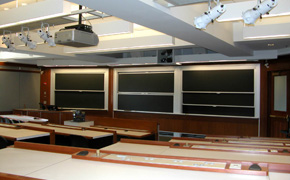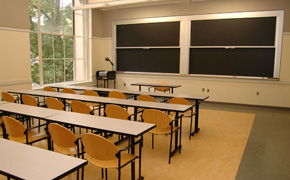This Course at MIT pages are part of the OCW Educator initiative, which seeks to enhance the value of OCW for educators.
This Course at MIT pages provide context for how the course materials published on OCW were used at MIT. They are part of the OCW Educator initiative, which seeks to enhance the value of OCW for educators.
Course Overview
This page focuses on the course 2.06 Fluid Dynamics as it was taught by Prof. Kripa Varanasi in Spring 2013.
Fluid Dynamics is a half-term course for undergraduate students in Course 2-A (Bachelor of Science in Engineering as recommended by the Department of Mechanical Engineering). Students are introduced to the fundamental principles and laws of fluid mechanics.
Course Outcomes
Course Goals for Students
- To formulate the models necessary to study, analyze, and design fluid systems through the application of fundamental principles
- To develop the problem-solving skills essential to good engineering practice of fluid mechanics in practical applications
Curriculum Information
Prerequisites
- 2.01 Elements of Structures
Requirements Satisfied
- Bachelor of Science in Engineering as recommended by the Department of Mechanical Engineering degree requirement
Offered
- Every spring semester (second half of term)

Breakdown by Year
Students are encouraged to take this course as sophomores.
Breakdown by Major
Most students who take this course are pursuing a Bachelor of Science in Engineering degree as recommended by the Department of Mechanical Engineering.
During an average week in the spring semester, students were expected to spend 12 hours on the course, roughly divided as follows:
Lecture
- Two class sessions per week, each lasting 1.5 hours; 12 sessions total
Recitation
- One recitation session per week, lasting 1 hour; 5 sessions total. Students were divided into two recitation groups, with one group meeting on Thursdays and the other group meeting on four Fridays and a Monday.
- Led by Prof. Varanasi to give students practice working through problems similar to their assignments
Out of Class
Semester Breakdown
This half-term course ran during the second half of the spring semester.
| WEEK | M | T | W | Th | F |
|---|---|---|---|---|---|
| 1 |  |  |  |  |  |
| 2 |  |  |  |  |  |
| 3 |  |  |  |  |  |
| 4 |  |  |  |  |  |
| 5 |  |  |  |  |  |
| 6 |  |  |  |  |  |
| 7 |  |  |  |  |  |
| 8 |  |  |  |  |  |
| 9 |  |  |  |  |  |
| 10 |  |  |  |  |  |
| 11 |  |  |  |  |  |
| 12 |  |  |  |  |  |
| 13 |  |  |  |  |  |
| 14 |  |  |  |  |  |
| 15 |  |  |  |  |  |
| 16 |  |  |  |  |  |
 No classes throughout MIT
No classes throughout MIT Lecture session
Lecture session Assignment due date
Assignment due date No class session scheduled
No class session scheduled Recitation session
Recitation session Quiz
QuizLead Instructor (Prof. Kripa Varanasi)
- Design and structure the course
- Prepare and deliver lectures
- Work through problems during the recitations
- Interact with students during office hours
Teaching Assistants (2 students in mechanical engineering, either graduate or advanced undergraduate)
- Serve as a resource for students during office hours, and on the class forum
- Lead quiz review sessions before each of the quizzes


 Room 1 of 2
Room 1 of 2 
